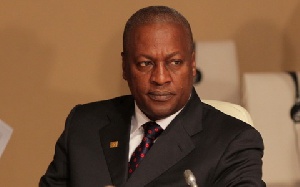Ghana will seek just $1 billion from a Eurobond this year as it heads into talks with the IMF aimed at restoring fiscal balance as part of a larger plan of economic reform, President John Mahama said in an interview on Friday.
The West African country may look for further financing if it can secure an assistance deal with the International Monetary Fund (IMF), Mahama said, adding that former finance minister Kwesi Botchwey would lead talks due to start on Sept. 16.
Ghana said in August it would seek an IMF deal to tackle fiscal problems including inflation, a stubborn budget deficit and a currency that has tumbled around 40 percent this year.
Ghana has previously been a model for West Africa because of its sustained high rates of economic growth on the back of exports of gold, oil and cocoa and its track record of stable democracy.
But its recent fiscal troubles are a sign of an unbalanced economy. The problems have also complicated plans for a third Eurobond to fund infrastructure and repay debt from the country's first Eurobond in 2007, potentially raising the cost of borrowing and making the debt less attractive to investors.
Ghana's parliament has approved $1.5 billion of borrowing in this year's bond.
"We initially had looked to bring in $1 billion to support the budget and then probably another $500 million to retire the earlier (2007) bond. What we are looking at is to suspend retiring the earlier bond until next year," Mahama said.
Finance Minister Seth Terkper is in Europe this week leading a roadshow on that bond, which is set to be launched next week.
Mahama said he had no immediate plans to change his key economic team, though he had brought in a few new people to strengthen it. He spoke to Reuters at his office in Flagstaff House, which is the presidential palace.
The government hopes to reach agreement with the IMF by November on a potential programme, Deputy Finance Minister Mona Helen Quartey said in London on Friday.
Mahama stressed that the purpose of pursuing an IMF deal was not simply to dig the country out of a short term fiscal hole and the government didn't primarily want IMF cash.
Instead, it wanted to work with the IMF, the World Bank and the African Development Bank on an ambitious set of institutional reforms, programmes to alleviate poverty and programmes to spur job creation through the private sector.
"We are looking to work with the IMF, both to consolidate the fiscal but then also to carry out the kind of institutional reforms that would be necessary to sustain that macro economic stability so that going forward, hopefully, this country will probably not go into an IMF program again," he said.
ELECTION CYCLE
Key to success will be whether the changes can be sustained beyond 2016, when Mahama's ruling National Democratic Congress faces an election.
"My eye is not on 2016. My eye is beyond 2016. This transformation agenda cannot be achieved in two years and so any actions and activities we'll start with regards to negotiations with the IMF will go beyond an election cycle," he said.
Mahama is a former vice president who came to power in 2012 on the death through illness of his predecessor John Atta Mills. He went on to win a four-year term that December, defeating Nana Akufo-Addo in a tight election.
The fiscal problems, which came to light in early 2013, stem from the implementation of a public sector pay policy.
The government has struggled to bring down the deficit, which stood at 10.2 percent in 2013. It cut utility and fuel subsidies and pursued what it called a "home grown" package of measures.
The government hoped to reduce inflation, which hit 15.3 percent in July, down to 11-12 percent by the end of the year, Mahama said, but he added that the plan had run into obstacles.
"We haven't been able to create the turn around as quickly as we had hoped because of scepticism in the international community," he said.
Click to view details



Business News of Sunday, 7 September 2014
Source: Reuters

















